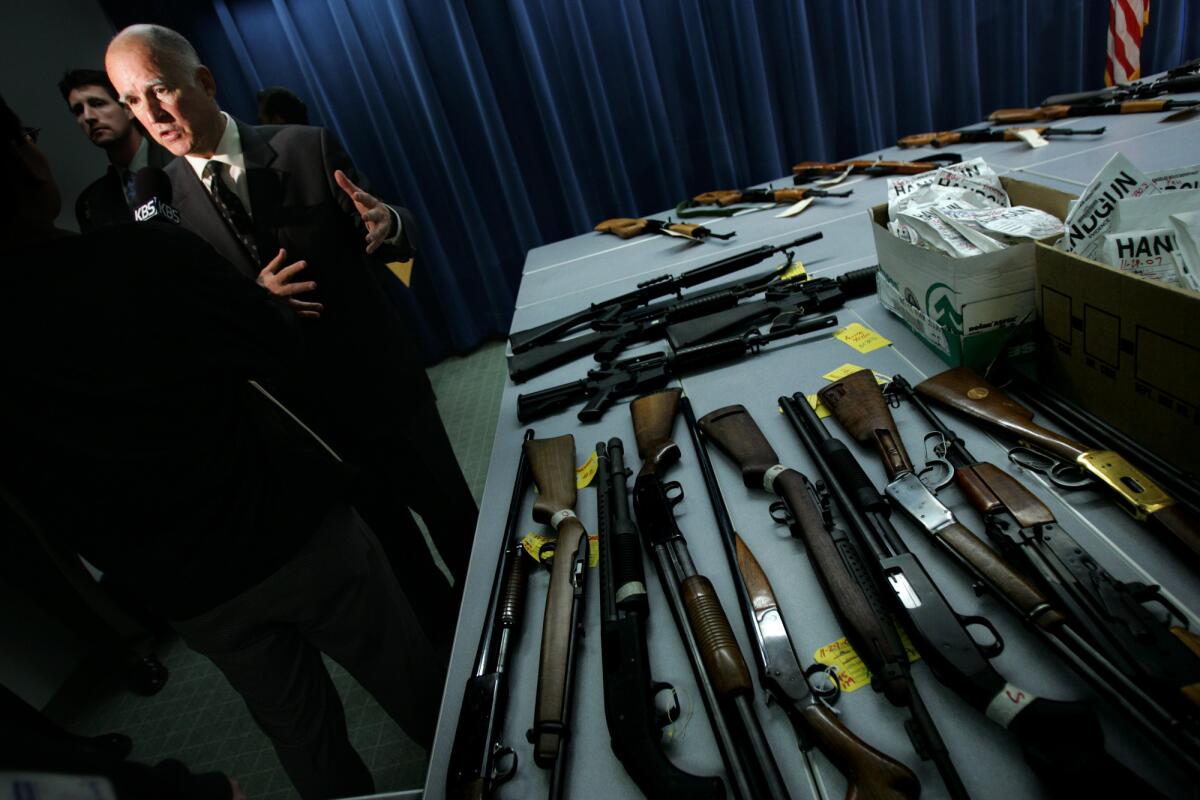Senators blast delays in seizing guns from criminals, mentally ill

Spearking at Dec. 10, 2007, news conference in Los Angeles, Gov. Jerry Brown, then attorney general, shows guns seized from criminals during a law enforcement operation.
- Share via
Reporting from Sacramento — Two years after receiving $24 million for the task, officials with the state Department of Justice said Thursday that the agency needs up to three more years to eliminate a backlog of people who improperly own firearms despite criminal convictions or mental illness.
Dissatisfied with the slow progress, state lawmakers called for fixes to the $24-million program designed to eliminate the backlog of approximately 20,000 people who possess more than 40,000 firearms. When the money was allocated, the Justice Department promised to eliminate the backlog in three years.
Members of a Senate panel said during a hearing Thursday that they are alarmed that 40% of the funds have been spent but the backlog has only been reduced by about 17%, meaning that with thousands more added each year there are still more than 16,000 people on the list.
The state may be able to reduce the backlog to 10,000 people by the time the special funding runs out next year, said Stephen Lindley, who is chief of the Justice Department’s Bureau of Firearms. He told the Senate budget subcommittee on public safety that the department needs two to three more years to eliminate the backlog.
“There is concern in the Legislature that we need to do better,” said Sen. Loni Hancock (D-Berkeley), who chairs the panel.
Hancock said she was particularly troubled that 38 special agents hired and trained by the agency at a cost of $20,000 each have left the program for other, more permanent jobs within the department, some within weeks of being employed.
Hancock said she would introduce legislation that requires the program to be repaid training and hiring costs for agents who leave the special program within a year.
She also said some remedy is needed to a problem in which the special agents are not able to get into the homes of a number of people on the list because they don’t have a search warrant.
Lindley said some cases involve guns believed purchased in the 1990s so the information is too “stale” to get a search warrant. Being on the list of armed prohibited persons is not itself enough to provide probable cause to get a warrant.
Hancock recommended that the department prioritize newer cases in which staleness is not an issue. “We need to figure this out. This is obviously a big impediment,” she told Lindley.
Sen. Joel Anderson (R-San Diego) complained that the program has gone after people with relatively minor crimes from the 1970s when new, violent felons are left on the list. “Why are we taking valuable resources and spending them in such a frivolous way,” he asked.
The issue has potential political implications given that Atty. Gen. Kamala D. Harris has announced a campaign for the U.S. Senate.
Sen. Mark Leno (D-San Francisco), a close ally of Harris and author of the bill that allocated the $24 million, appeared at the hearing and came to her defense Thursday.
He said if the special effort had not been pursued, the number of prohibited gun owners would be about 28,000 now. “We have made extraordinary progress,” Leno said.
More to Read
Sign up for Essential California
The most important California stories and recommendations in your inbox every morning.
You may occasionally receive promotional content from the Los Angeles Times.











